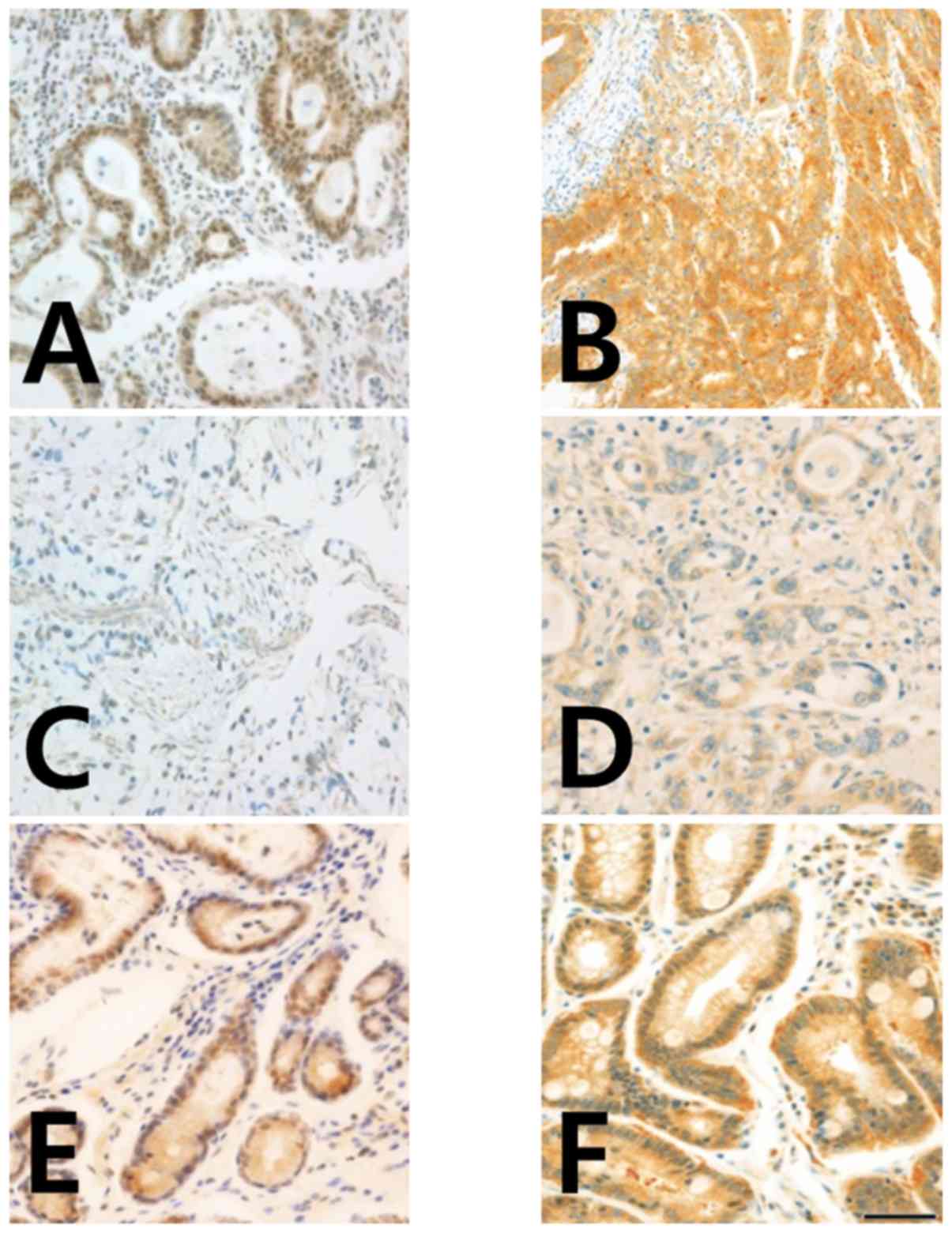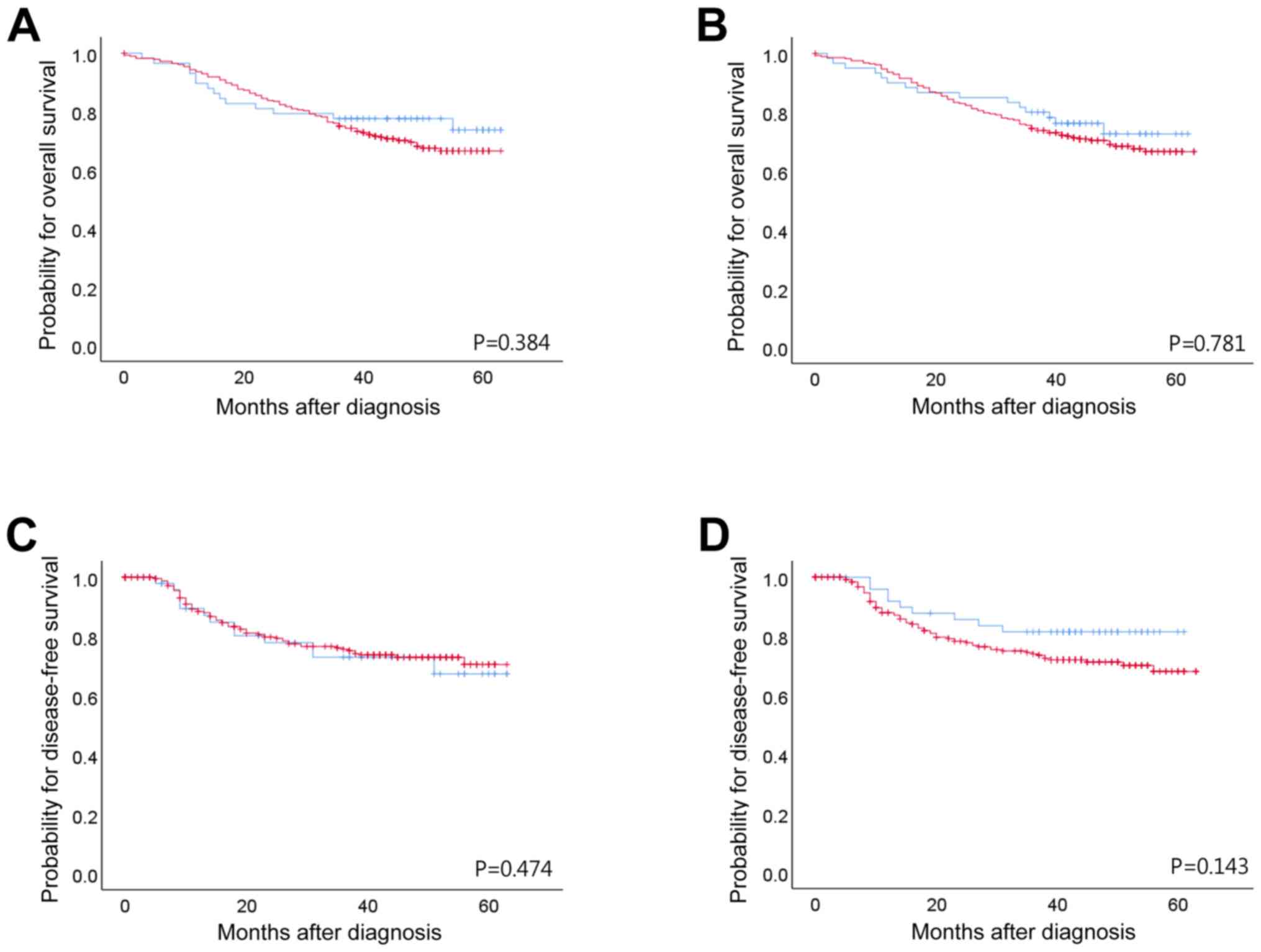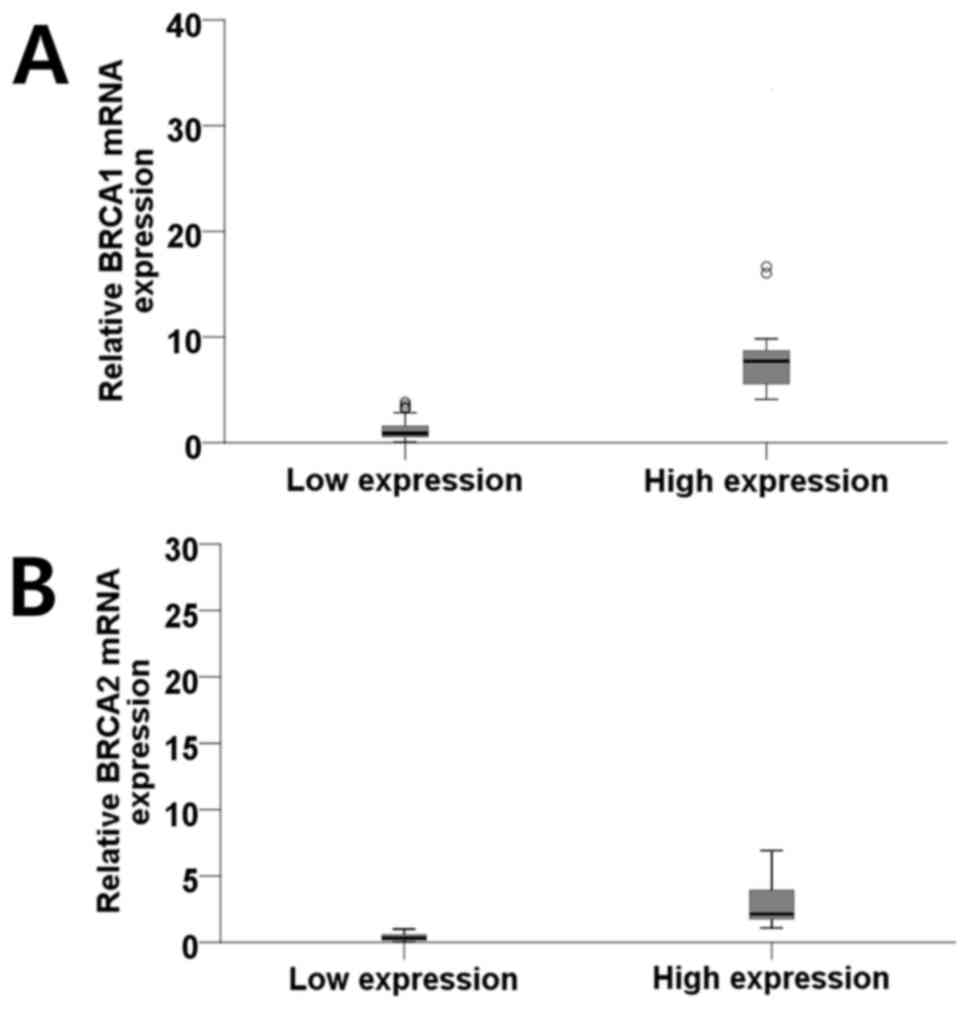|
1
|
Bray F, Ferlay J, Soerjomataram I, Siegel
RL, Torre LA and Jemal A: Global cancer statistics 2018: GLOBOCAN
estimates of incidence and mortality worldwide for 36 cancers in
185 countries. CA Cancer J Clin. 68:394–424. 2018. View Article : Google Scholar : PubMed/NCBI
|
|
2
|
Chen W, Wang J, Li X, Li J, Zhou L, Qiu T,
Zhang M and Liu P: Prognostic significance of BRCA1 expression in
gastric cancer. Med Oncol. 30:4232013. View Article : Google Scholar : PubMed/NCBI
|
|
3
|
Brose MS, Rebbeck TR, Calzone KA, Stopfer
JE, Nathanson KL and Weber BL: Cancer risk estimates for BRCA1
mutation carriers identified in a risk evaluation program. J Natl
Cancer Inst. 94:1365–1372. 2002. View Article : Google Scholar : PubMed/NCBI
|
|
4
|
Wang L, Wei J, Qian X, Yin H, Zhao Y, Yu
L, Wang T and Liu B: ERCC1 and BRCA1 mRNA expression levels in
metastatic malignant effusions is associated with chemosensitivity
to cisplatin and/or docetaxel. BMC Cancer. 8:972008. View Article : Google Scholar : PubMed/NCBI
|
|
5
|
Semba S, Yokozaki H, Yasui W and Tahara E:
Frequent microsatellite instability and loss of heterozygosity in
the region including BRCA1 (17q21) in young patients with gastric
cancer. Int J Oncol. 12:1245–1251. 1998.PubMed/NCBI
|
|
6
|
Shim HJ, Yun JY, Hwang JE, Bae WK, Cho SH,
Lee JH, Kim HN, Shin MH, Kweon SS, Lee JH, et al: BRCA1 and XRCC1
polymorphisms associated with survival in advanced gastric cancer
treated with taxane and cisplatin. Cancer Sci. 101:1247–1254. 2010.
View Article : Google Scholar : PubMed/NCBI
|
|
7
|
Goffin JR, Chappuis PO, Bégin LR, Wong N,
Brunet JS, Hamel N, Paradis AJ, Boyd J and Foulkes WD: Impact of
germline BRCA1 mutations and overexpression of p53 on prognosis and
response to treatment following breast carcinoma: 10-year follow up
data. Cancer. 97:527–536. 2003. View Article : Google Scholar : PubMed/NCBI
|
|
8
|
Kennedy RD, Quinn JE, Mullan PB, Johnston
PG and Harkin DP: The role of BRCA1 in the cellular response to
chemotherapy. J Natl Cancer Inst. 96:1659–1668. 2004. View Article : Google Scholar : PubMed/NCBI
|
|
9
|
Reguart N, Cardona AF, Carrasco E, Gomez
P, Taron M and Rosell R: BRCA1: A new genomic marker for
non-small-cell lung cancer. Clin Lung Cancer. 9:331–339. 2008.
View Article : Google Scholar : PubMed/NCBI
|
|
10
|
Aly A and Ganesan S: BRCA1, PARP, and
53BP1: Conditional synthetic lethality and synthetic viability. J
Mol Cell Biol. 3:66–74. 2011. View Article : Google Scholar : PubMed/NCBI
|
|
11
|
Foulkes WD: BRCA1 and BRCA2:
Chemosensitivity, treatment outcomes and prognosis. Fam Cancer.
5:135–142. 2006. View Article : Google Scholar : PubMed/NCBI
|
|
12
|
Bolton KL, Chenevix-Trench G, Goh C,
Sadetzki S, Ramus SJ, Karlan BY, Lambrechts D, Despierre E,
Barrowdale D, McGuffog L, et al: Association between BRCA1 and
BRCA2 mutations and survival in women with invasive epithelial
ovarian cancer. JAMA. 307:382–390. 2012. View Article : Google Scholar : PubMed/NCBI
|
|
13
|
Kim JW, Cho HJ, Kim M, Lee KH, Kim MA, Han
SW, Oh DY, Lee HJ, Im SA, Kim TY, et al: Differing effects of
adjuvant chemotherapy according to BRCA1 nuclear expression in
gastric cancer. Cancer Chemother Pharmacol. 71:1435–1443. 2013.
View Article : Google Scholar : PubMed/NCBI
|
|
14
|
Wei J, Costa C, Ding Y, Zou Z, Yu L,
Sanchez JJ, Qian X, Chen H, Gimenez-Capitan A, Meng F, et al: mRNA
expression of BRCA1, PIAS1, and PIAS4 and survival after
second-line docetaxel in advanced gastric cancer. J Natl Cancer
Inst. 103:1552–1556. 2011. View Article : Google Scholar : PubMed/NCBI
|
|
15
|
Zhang ZZ, Liu YJ, Yin XL, Zhan P, Gu Y and
Ni XZ: Loss of BRCA1 expression leads to worse survival in patients
with gastric carcinoma. World J Gastroenterol. 19:1968–1974. 2013.
View Article : Google Scholar : PubMed/NCBI
|
|
16
|
Edge SB, Byrd DR, Compton CC, Fritz AG,
Greene FL and Trotti A: AJCC cancer staging manual. 7th. France:
Springer; 2010
|
|
17
|
Livak KJ and Schmittgen TD: Analysis of
relative gene expression data using real-time quantitative PCR and
the 2(−Delta Delta C(T)) method. Methods. 25:402–408. 2001.
View Article : Google Scholar : PubMed/NCBI
|
|
18
|
Tsibulak I, Wieser V, Degasper C,
Shivalingaiah G, Wenzel S, Sprung S, Lax SF, Marth C, Fiegl H and
Zeimet AG: BRCA1 and BRCA2 mRNA-expression prove to be of clinical
impact in ovarian cancer. Br J Cancer. 119:683–692. 2018.
View Article : Google Scholar : PubMed/NCBI
|
|
19
|
Al-Mulla F, Abdulrahman M, Varadharaj G,
Akhter N and Anim JT: BRCA1 gene expression in breast cancer: A
correlative study between real-time RT-PCR and
immunohistochemistry. J Histochem Cytochem. 53:621–629. 2005.
View Article : Google Scholar : PubMed/NCBI
|
|
20
|
Garg K, Levine DA, Olvera N, Dao F,
Bisogna M, Secord AA, Berchuck A, Cerami E, Schultz N and Soslow
RA: BRCA1 immunohistochemistry in a molecularly characterized
cohort of ovarian high-grade serous carcinomas. Am J Surg Pathol.
37:138–146. 2013. View Article : Google Scholar : PubMed/NCBI
|
|
21
|
Peshkin BN, Alabek ML and Isaacs C:
BRCA1/2 mutations and triple negative breast cancers. Breast Dis.
32:25–33. 2010. View Article : Google Scholar : PubMed/NCBI
|
|
22
|
Galizia E, Giorgetti G, Piccinini G,
Santinelli A, Loretelli C, Bianchi F, Gagliardini D, Carbonari G,
Pisa E, Belvederesi L, et al: BRCA1 expression in triple negative
sporadic breast cancers. Anal Quant Cytol Histol. 32:24–29.
2010.PubMed/NCBI
|
|
23
|
Wang GH, Zhao CM, Huang Y, Wang W, Zhang S
and Wang X: BRCA1 and BRCA2 expression patterns and prognostic
significance in digestive system cancers. Hum Pathol. 71:135–144.
2018. View Article : Google Scholar : PubMed/NCBI
|
|
24
|
Meijer TG, Verkaik NS, Sieuwerts AM, van
Riet J, Naipal KAT, van Deurzen CHM, den Bakker MA, Sleddens HFBM,
Dubbink HJ, den Toom TD, et al: Functional ex vivo assay reveals
homologous recombination deficiency in breast cancer beyond BRCA
gene defects. Clin Cancer Res. 24:6277–6287. 2018. View Article : Google Scholar : PubMed/NCBI
|
|
25
|
Clark-Knowles KV, O'Brien AM and Weberpals
JI: BRCA1 as a therapeutic target in sporadic epithelial ovarian
cancer. J Oncol. 2010:8910592010. View Article : Google Scholar : PubMed/NCBI
|
|
26
|
Pothuri B: BRCA1- and BRCA2-related
mutations: Therapeutic implications in ovarian cancer. Ann Oncol.
24 Suppl 8:viii22–viii27. 2013. View Article : Google Scholar : PubMed/NCBI
|
|
27
|
Yang Q, Sakurai T, Mori I, Yoshimura G,
Nakamura M, Nakamura Y, Suzuma T, Tamaki T, Umemura T and Kakudo K:
Prognostic significance of BRCA1 expression in Japanese sporadic
breast carcinomas. Cancer. 92:54–60. 2001. View Article : Google Scholar : PubMed/NCBI
|
|
28
|
Zhang Y, Wu H, Yang F, Ning J, Li M, Zhao
C, Zhong S, Gu K and Wang H: Prognostic value of the expression of
DNA repair-related biomarkers mediated by alcohol in gastric cancer
patients. Am J Pathol. 188:367–377. 2018. View Article : Google Scholar : PubMed/NCBI
|
|
29
|
Yoshida K and Miki Y: Role of BRCA1 and
BRCA2 as regulators of DNA repair, transcription, and cell cycle in
response to DNA damage. Cancer Sci. 95:866–871. 2004. View Article : Google Scholar : PubMed/NCBI
|
|
30
|
Takata M, Tachiiri S, Fujimori A, Thompson
LH, Miki Y, Hiraoka M, Takeda S and Yamazoe M: Conserved domains in
the chicken homologue of BRCA2. Oncogene. 21:1130–1134. 2002.
View Article : Google Scholar : PubMed/NCBI
|

















